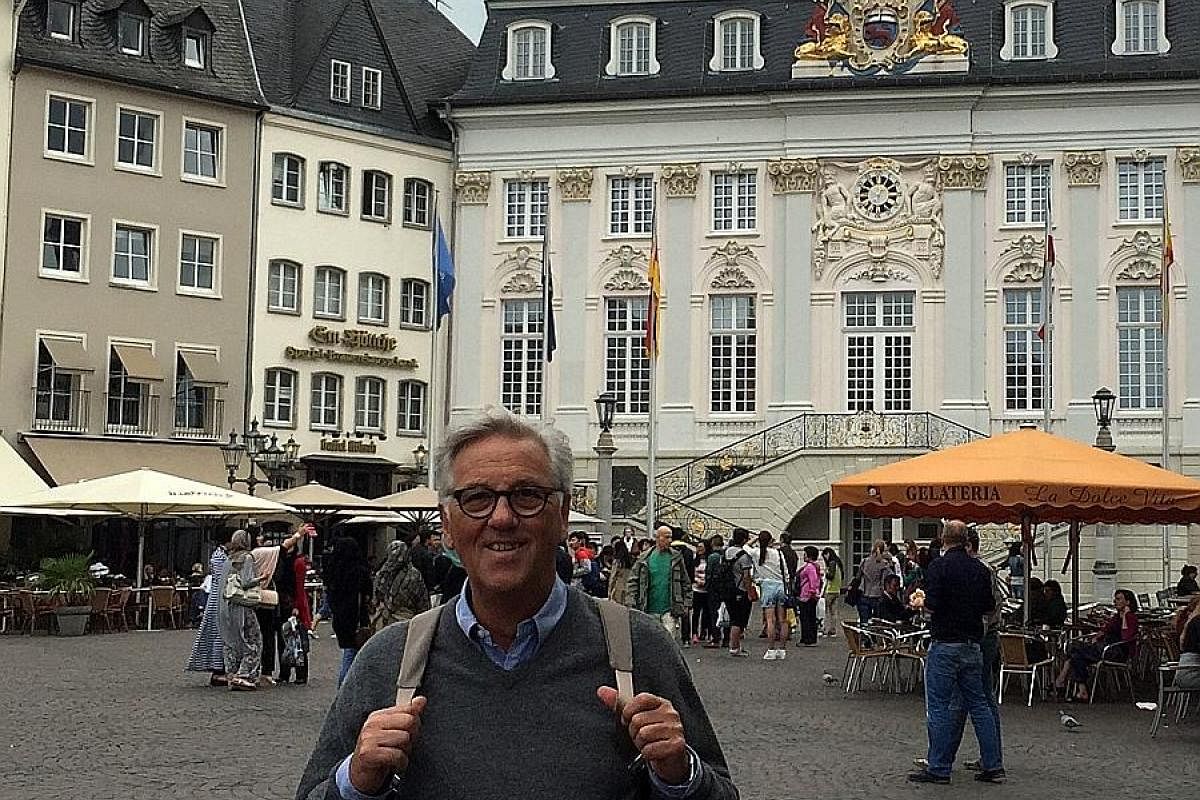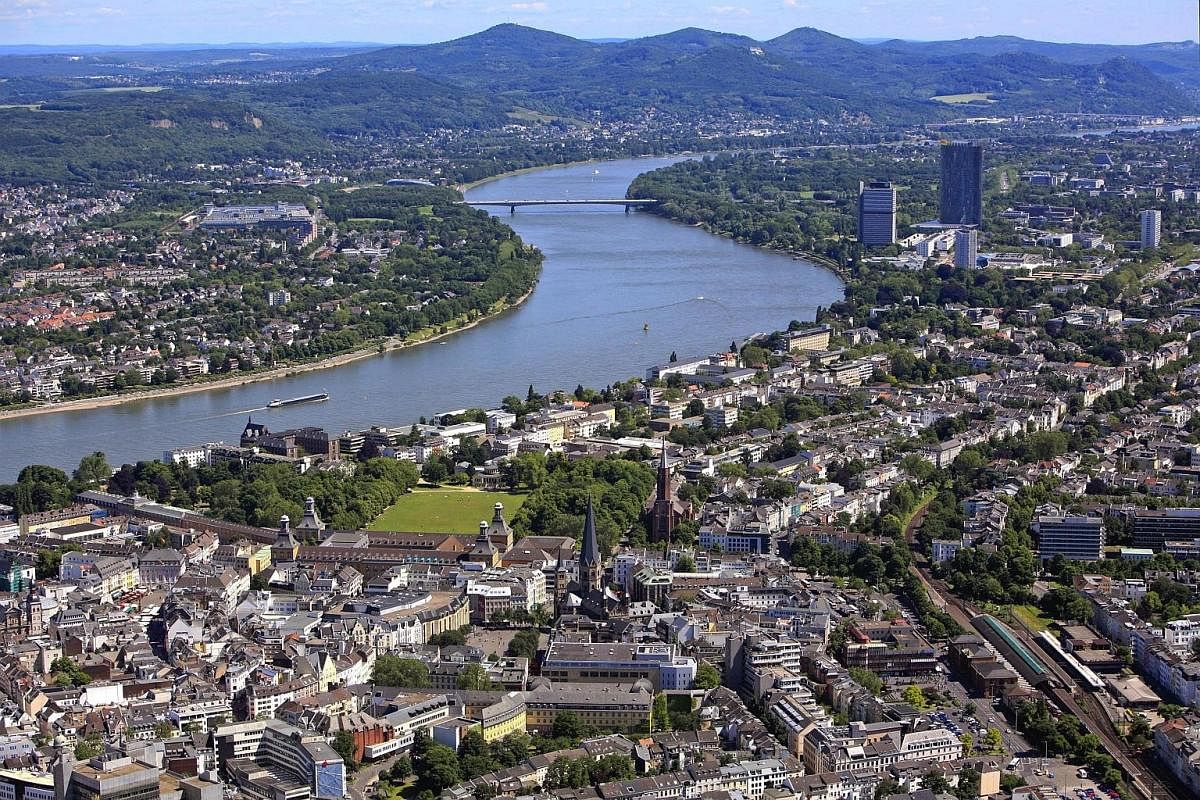-
Getting there
-
Fly into Cologne Bonn Airport on Singapore Airlines and Lufthansa via Munich, Turkish Airlines via Istanbul, or Swiss International Air Lines via Zurich, which are the quickest routes. From the airport, it is a 20-minute drive to Bonn.
Tips
• To help plan one's trip, tourism information can be found at bit.ly/2od2fER
• Make use of the Bonn Regio WelcomeCard (bit.ly/2oddgGj), which gives free or reduced-price admission to many museums and leisure attractions in Bonn, as well as free journeys by bus, tram and train. It starts from €10 (S$15) a person or €19 for a family of five and is available at the tourist information office and some hotels.
• It is generally safe to travel in Bonn and the surrounding region. People have a very positive attitude towards life. One of the sayings in the Rhine dialect goes "et it noch immer jutjegange", which means "in the end, it always turns out well".
Travel Black Book Ambassadors Series
Bonn: Germany in a nutshell
The best of home: Ambassadors to Singapore provide an insider's guide to their favourite destinations


Who: Dr Michael Witter, 66, German Ambassador to Singapore
Favourite destination in Germany: Bonn, a small city with its roots in the Roman Empire, and located on the banks of the Rhine river in the state of North Rhine-Westphalia, is Germany in a nutshell.
The city has it all - charming flair as one of Germany's oldest cities; many historic buildings and museums; typical German dishes and beverages with a local twist; unique accommodations; internationally renowned festivals such as Beethovenfest; and annual carnivals.
As capital of the former West Germany, it also offers a unique insight into the country's recent history.
Bonn is situated amid a wonderful landscape. It offers romantic riverboat cruises along the Rhine and hiking routes along castles, vineyards and more. The city is also famous as the birthplace of composer and pianist Ludwig van Beethoven.
I lived in Bonn for almost 10 years as a young diplomat in the 1980s, when the city was still the capital of West Germany. It was where I started my career, where I got married and where my first child was born and baptised.
SEE
There are more than 30 museums in Bonn, many of them in the city centre. A must-see is BeethovenHaus (www.beethovenhaus-bonn.de), a museum dedicated to Beethoven's life and work. It is set up in the house where he was born in 1770. You can see rare artefacts and documents of his and listen to Beethoven-themed concerts in the Chamber Music Hall.
You should also not miss the LVR-LandesMuseum (www.landesmuseum-bonn.lvr.de/en/startseite.html), which is dedicated to Rhineland's archaeology, art and cultural history. You can check out, among many artefacts detailing its cultural history, the remains of the famous Neanderthal Man from 40,000BC.
The Bonn Minster, the main Catholic church in the city and one of Germany's oldest churches, is another must-see. Its history stretches back to the time of early Christianity on the Rhine. Excavations under the crypt have shown it was originally a cella memoriae, a room where early Christians met for feasts that was established in the third century. The actual building was completed in 1248, during the transition from the Romantic to the Gothic period.
One of my favourite neighbourhoods is Bonn's Sudstadt (Southern Quarter), with its magnificent architectural facades built between the end of the 19th and the early 20th centuries. Here, you will find appealing pubs, cafes and restaurants. It is also where the Botanic Gardens (www.botgart.uni-bonn.de/o_inter/engl01.php) are. Getting there is an easy 1km walk along the beautiful avenue Poppelsdorfer Allee, from Kaiserplatz in the city centre.
To better understand the region, visit Bonn's Bundesviertel (former government district), a symbol of the first successful German democracy, and the Haus der Geschichte (www.hdg.de/haus-der-geschichte). The museum highlights German history from the end of World War II to the present.
A hidden gem with special meaning for me is St Maria and Clemens, a Romanesque church in the Schwarzrheindorf neighbourhood on the eastern side of the Rhine, where my wife and I were married. It is one of the most important Romanesque churches in Germany, particularly because of its rich ceiling paintings.
EAT
A unique restaurant for local specialities is Em Hoettche (www.em-hoettche.de), right next to the old town hall. In operation since 1389, it is one of the city's oldest restaurants. Beethoven ate there and is said to have danced there with his youthful love, Barbe Koch.
A must-try dish is Rheinischer Sauerbraten (S$24). Sauerbraten (sour roast) is arguably Germany's national dish. The dish varies by region, mainly because of different ingredients.
Generally, it is made by marinating a beef roast in a sour-sweet marinade of vinegar or wine and spices for two to three days before browning it, then simmering the meat in the marinade for several hours. The result is a very tender roast and a delicious sauce.
Rhineland Sauerbraten is generally sweeter than those in other parts of Germany and contains raisins and gingerbread. It is traditionally served with dumplings, boiled potatoes or noodles.
For dessert or an afternoon snack with coffee, try apfelstrudel (S$10), warm apple cake served with vanilla sauce and vanilla ice cream.
Brauhaus Boennsch (www.boennsch.de) is a restaurant in the city centre which serves specialities from the Rhineland and delicious, self-brewed beer. Prices for mains range from S$14 to S$32.
For breakfast, there are many nice cafes with excellent coffee and delicious food. A very good place is Cafe Spitz (www.spitz-bonn.de) on Sterntorbrucke street in the city centre, which serves a delicious German breakfast of tasty crispy buns with cheese and cold cuts. If you go on a Sunday or public holiday, you can enjoy an all-you-can eat breakfast for S$14.50, excluding drinks.
PLAY
Every year from September to the beginning of October, Bonn hosts Beethovenfest (en.beethovenfest.de), with top international orchestras, major ensembles, famous soloists and the next generation of promising artists performing in venues such as palaces, churches, castles and other historic buildings throughout the region.
Rhein in Flammen (www.rhein-in-flammen.com) is a firework display on one of the most beautiful sections of the Rhine, between the cities of Linz and Bonn. Fireworks and more than 800 red torches line the river, beautifully illuminating the surrounding mountains. It takes place in Bonn on the first weekend of May, but can also be experienced in other parts of the Rhine during the summer months.
The Bonn region is considered the gateway to the Romantic Rhine and the stretch to Bingen features vineyards, fortresses built on cliffs and idyllic towns.
Steamboats carry tourists up and downstream from Easter to the end of October. From Bonn, boats take you up the river on a three- to fivehour trip, past hillsides to the wine towns of Koenigswinter and Linz, with their picturesque halftimbered houses. Do not miss the chance to try a glass of excellent wine during one of the stops.
If you would like to be more active, consider cycling along Germany's longest river. Bonn prides itself on being one of the most cyclefriendly towns in North RhineWestphalia and details of the more than 300 routes can be found at www.mapmyride.com/de/bonn-north-rhine-westphalia.
You can explore many regional sites on a 21/2-hour guided tour along the Rhine. If you feel fit enough, you can cycle south towards the charming town of Koblenz or north towards Cologne.
About 30km north of Bonn is Cologne, another city founded by the Romans. Some remnants of that period can still be found there, but it is most famous for its cathedral, a Unesco World Heritage Site.
While strolling to the city's charming old quarters, stop by one of the many pubs and enjoy a Kolsch, a special beer brewed in Cologne. It is a light ale served in the traditional 0.2l Kolsch glasses, which are tall and cylindrical.
One of the many good places to enjoy one is Frueh am Dom (www.frueh-am-dom.de), a microbrewery next to Cologne Cathedral which has the rustic and cosy ambience of a typical Cologne pub. A thing to note: as long as you do not cover your empty glass with your coaster, you will be served more beer.
Bonn is also the ideal starting point for an excursion to Siebengebirge, Germany's oldest nature reserve. You can travel by tram or boat to Koenigswinter and, from there, go walking in Siebengebirge. The oldest rack-and-pinion railway in Germany will take you to the summit, the Drachenfels, or you can walk up. You will be rewarded by one of the best views of the Rhine valley and the surrounding area.
SHOP
German confectionery company Haribo was founded in Bonn in 1920. Today, its wine gum, liquorice and marshmallows are available worldwide, including in Singapore. However, many varieties of the sweets are less known outside Germany and make nice and affordable gifts.
Also produced in the city since 1876 and now globally consumed is Verpoorten Eierlikor, a rich liquor made of egg yolks, spices, sugar and brandy or rum. Today, about 1.3 million eggs are used to make the liquor every day and it is guaranteed to be a unique souvenir.
Bonn's city centre, the second largest and oldest pedestrian zone in Germany, also offers a large selection of specialist and chain stores.
STAY
Although a bit outside Bonn, Steigenberger Grandhotel Petersberg (bit.ly/2oaI6yM) is among my favourite places to stay or have a coffee while enjoying the view. Just like a castle, the hotel sits high above the landscape and offers spectacular views of the Siebengebirge mountains and the Rhine.
Another favourite is Rheinhotel Dreesen (www.rheinhoteldreesen.de), which offers good food and views and is a perfect starting point for bicycle tours along the river.
Right in the centre of Bonn, in the historic Marketplace, is Sternhotel (www.sternhotel-bonn.de), which offers modern elegance in a traditional building in the vicinity of major tourist attractions.
If you are still young at heart, consider a night in a vintage caravan at BaseCamp Young Hostel (www.basecamp-bonn.com) or book one of its Volkswagen Transporters and travel back in time to 1970s East Germany. The 16 vintage caravans, two night sleepers and two Airstreams are parked in a former storage facility which has been turned into an indoor campground. It is one of the coolest places in Bonn, if not all of Germany, and will offer you a very unique experience.
Join ST's Telegram channel and get the latest breaking news delivered to you.
A version of this article appeared in the print edition of The Sunday Times on April 02, 2017, with the headline Bonn: Germany in a nutshell. Subscribe


